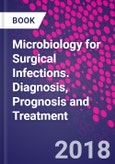Microbiology for Surgical Infections: Diagnosis, Prognosis and Treatment explores current trends in etiology and antibiotic resistance of pathogens responsible for devastating and complex surgical infections. Clinicians and researchers report the most recent advances in diagnostic approaches to bacterial and non-bacterial surgical infections, including invasive fungal infections. Current guidelines for prophylaxis of community-acquired and nosocomial infections, complications in surgery, and improvement of diagnosis and treatment of these devastating surgical infections are also discussed.
The work gives specific attention to intra-abdominal and wound infections, as well as infections in cardiac surgery and neurosurgery. Taken together, these explorations inform the work of specialists in different surgical arenas, as well as those working in microbiology.
Microbiology for Surgical Infections provides a resource to those working to improve outcomes in this complicated arena by discussing prospects for future study and identifying targets for future research.
Table of Contents
Section A: Infection control measures for the prevention of surgical infections 1. Infection control measures for the prevention of surgical site infections 2. Microbiological assessment before surgical intervention 3. Bacterial adherence to biomaterials used in surgical procedures Section B: Intra-abdominal infections 4. Multidrug-resistant bacteria in pancreatic surgery 5. Anastomotic leakage after colonic and rectal surgery: operative and conservative management 6. Acute appendicitis: an open issue. Current trends in diagnostic and therapeutic options 7. Assessment of severity state and prognosis in surgical patients with secondary peritonitis 8. Pathogenesis and management of dialysis access infections 9. Microbiological diagnosis and antimicrobial therapy in acute pancreatitis Section C: Cardiovascular infections 10. Infective endocarditis Section D: Skin and soft tissue infections 11. Natural remedies for the treatment of wounds and wound infection 12. Bioactive molecules of herbal extracts with anti-infective and wound healing properties 13. Role of honey and propolis in the treatment of infected wounds 14. Necrotizing soft tissue infections 15. Significance of surgical intervention in the management of diabetic foot infections Section E: Spinal infections 16. Spinal epidural abscesses Section F: Surgical infections of non-bacterial origin 17. State of the art in the laboratory methods for the diagnosis of invasive fungal diseases
Authors
Kateryna Kon Associate Professor, Department of Microbiology, Virology and Immunology, Kharkiv National Medical University, Kharkiv, Ukraine. Dr. Kateryna Kon, MD, PhD, currently works at the Department of Microbiology, Virology and Immunology at Kharkiv National Medical University, Kharkiv, Ukraine as an Associate Professor. Dr. Kon received the Best Young Scientist of Kharkiv Award in 2007. She has ten years of teaching and fifteen years of research experience. She is an editorial board member of six international peer-reviewed journals.Dr. Kon's scientific contributions include more than 100 publications, 6 books and 18 scientific articles. The main focus of Dr. Kon's research is antibiotic resistance in bacteria, coping with microbial resistance by plant essential oils and nanoparticles, microbiology of surgical and gynaecological infections, application of different statistical methods to analysis of biomedical data. Mahendra Rai Professor and Head, Department of Biotechnology, Amravati University, Amravati, Maharashtra, India. Professor Mahendra Rai UGC-BSR Fellow is presently Visiting Professor in Department of Microbiology, Nicolaus Copernicus University, Torun, Poland. Formerly he was Headead at the Department of Biotechnology, Sant Gadge Baba Amravati University at Amravati, Maharashtra, India. He was Visiting Scientist at different Universities like University of Geneva, Switzerland, Debrecen University, University of Campinas, Brazil, Nicolaus Copernicus University, Poland. His area of expertise includes microbial biotechnology and nanobiotechnology. His present research interests are application of nanobiotechnology in medicine and agriculture, in particular, the use of metallic nanoparticles as a new generation of antimicrobials. He has published more than 450 research papers in India and abroad. In addition, he has edited/authored more than 65 books.








